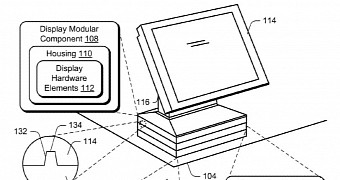Microsoft is continuously looking into ways to expand its hardware device portfolio with new projects, and the most recent one involves a modular PC with stackable components.
Modular devices seem to be gaining traction these days, so Microsoft appears to be interested in this concept, with the company having recently patented what could be its first modular PC with stackable components.
While the Redmond-based technology giant remains completely tight-lipped on this project, VentureBeat has recently spotted a new Microsoft patent that points to such plans. The patent was filed in July 2015 and was granted earlier this week.
According to the patent description, it could allow Microsoft to develop a new device that would let customers build their own PCs using parts they buy separately. As compared to the traditional PCs that you can already build with your own parts, this one would come with stackable components, so it would be very easy to remove and replace them, thus appealing to inexperienced users too.
Easy-to-replace parts, magnetic connection system
The components that could be replaced include a battery, CPU, graphics card, memory, storage, speakers, and Wi-Fi card while a display would be there by default and connected to all these parts with a hinge. Microsoft’s modular PC would come with dedicated housings for each component and include a magnetic system to easy attaching.
“The display modular component includes a power supply and may include one or more inputs that may be utilized with another device, such a HDMI, display ports, USB ports, and so on. The display modular component may also include a sufficient amount of ballast to counteract a weight of the display device such that component 108 may be placed on a surface,” Microsoft explains in the patent description.
Obviously, since this is still just a patent, there’s no guarantee that Microsoft would ever build such a modular PC, but with more companies looking at this side of the market, including Google with its Project Ara smartphones, the chances are that Redmond could be very serious about it.

 14 DAY TRIAL //
14 DAY TRIAL //